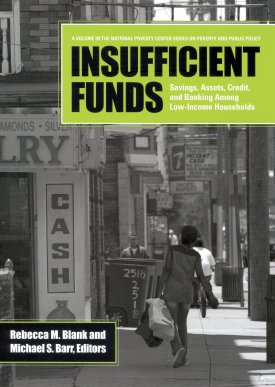
Insufficient Funds
About This Book
One in four American adults doesn’t have a bank account. Low-income families lack access to many of the basic financial services middle-class families take for granted and are particularly susceptible to financial emergencies, unemployment, loss of a home, and uninsured medical problems. Insufficient Funds explores how institutional constraints and individual decisions combine to produce this striking disparity and recommends policies to help alleviate the problem.
Mainstream financial services are both less available and more expensive for low-income households. High fees, minimum-balance policies, and the relative scarcity of banks in poor neighborhoods are key factors. Michael Barr reports the results of an in-depth study of financial behavior in 1,000 low- and moderate-income families in metropolitan Detroit. He finds that most poor households have bank accounts, but combine use of mainstream services with alternative options such as money orders, pawnshops, and payday lenders. Barr suggests that a tax credit for banks serving primarily disadvantaged customers could facilitate greater equality in the private financial sector.
Drawing on evidence from behavioral economics, Sendhil Mullainathan and Eldar Shafir show that low-income individuals exhibit many of the same patterns and weaknesses in financial decision making as middle-class individuals and could benefit from many of the same financial aids. They argue that savings programs that automatically enroll participants and require them to actively opt out in order to leave the program could drastically increase savings ability. Ronald Mann demonstrates that significant changes in the credit market over the past fifteen years have allowed companies to expand credit to a larger share of low-income families. Mann calls for regulations on credit card companies that would require greater disclosure of actual interest rates and fees. Raphael Bostic and Kwan Lee find that while home ownership has risen dramatically over the past twenty years, elevated risks for low-income families—such as foreclosure—may well outweigh the benefits of owning a home.
The authors ultimately argue that if we want to demand financial responsibility from low-income households, we have an obligation to assure that these families have access to the banking, credit, and savings institutions that are readily available to higher-income families. Insufficient Funds highlights where and how access is blocked and shows how government policy and individual decisions could combine to eliminate many of these barriers in the future.
REBECCA M. BLANK is the Robert S. Kerr Senior Fellow at the Brookings Institution.
MICHAEL S. BARR is professor of law at the University of Michigan Law School.
CONTRIBUTORS: Raphael W. Bostic, Daryl Collins, Kwan Ok Lee, Ronald J. Mann, Jonathan Morduch, Sendhil Mullainathan, Una Okonkwo Osili, Anna L. Paulson, Daniel Schneider, John Karl Scholz, Ananth Seshadri, Eldar Shafir, Michael Sherraden, Peter Tufano.
A Volume in the National Poverty Center Series on Poverty and Public Policy
